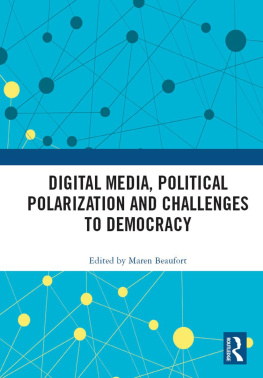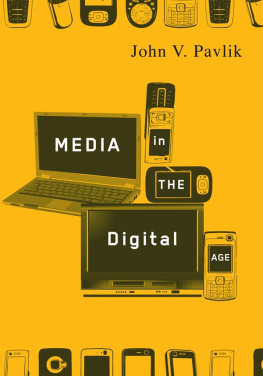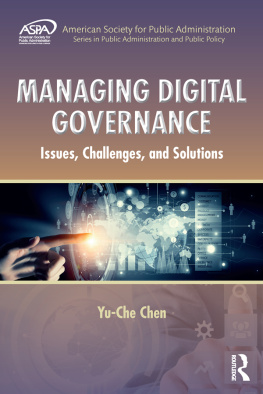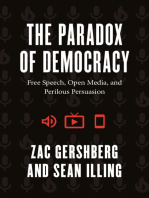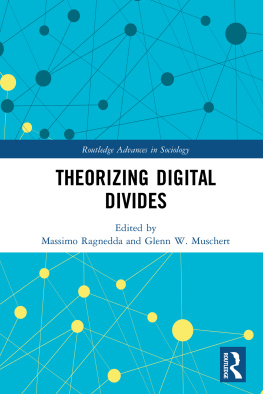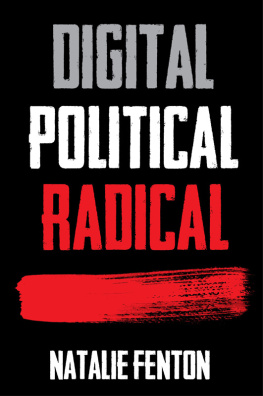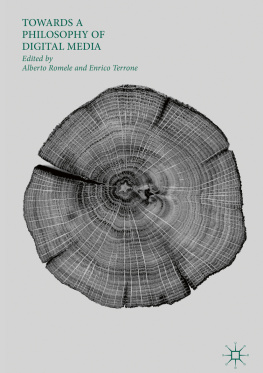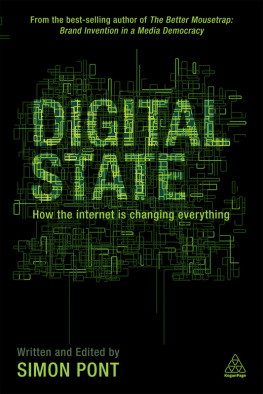Digital Media
and Democratic Futures
DEMOCRACY, CITIZENSHIP, AND CONSTITUTIONALISM
Rogers M. Smith and Mary L. Dudziak, Series Editors
Digital Media
and Democratic Futures

Edited by
Michael X. Delli Carpini

Copyright 2019 University of Pennsylvania Press
All rights reserved. Except for brief quotations used for purposes
of review or scholarly citation, none of this book may be
reproduced in any form by any means without written
permission from the publisher.
Published by
University of Pennsylvania Press
Philadelphia, Pennsylvania 19104-4112
www.upenn.edu/pennpress
Printed in the United States of America on acid-free paper
10 9 8 7 6 5 4 3 2 1
Library of Congress Cataloging-in-Publication Data
Names: Delli Carpini, Michael X., editor.
Title: Digital media and democratic futures / edited by Michael X.
Delli Carpini. Other titles: Democracy, citizenship, and
constitutionalism.
Description: 1st edition. | Philadelphia : University of Pennsylvania
Press, [2019] | Series: Democracy, Citizenship, and
Constitutionalism | Includes bibliographical references and index.
Identifiers: LCCN 2018034564 | ISBN 978-0-8122-5116-6
(hardcover : alk. paper)
Subjects: LCSH: Communication in politicsUnited States
21st century. | Digital mediaPolitical aspectsUnited States
21st century. | CommunicationPolitical aspectsUnited
States21st century. | DemocracyUnited States21st century.
Classification: LCC P95.82.U6 D54 2019 | DDC 320.973dc23
LC record available at https://lccn.loc.gov/2018034564
CONTENTS

Michael X. Delli Carpini
Rena Bivens
Daniel Kreiss
Thomas Elliott and Jennifer Earl
Beth Simone Noveck
Kelly Gates
Lisa Poggiali
Daniela Stockmann and Ting Luo
Jennifer Pan
Deen Freelon
10. Must Privacy Give Way to Use Regulation?
Helen Nissenbaum
Philip N. Howard
Michael X. Delli Carpini
On January 27, 2017 newly elected U.S. president Donald Trump signed Executive Order 13769, placing limits on the number of refugees admitted into the United States, suspending entry of aliens from seven predominantly Muslim nations, and indefinitely barring Syrian refugees from entering the country. Within minutes of its announcement, individuals and groups opposed to what was being called a Muslim ban took to social media, resulting in large and spontaneous demonstrations at airports and in cities around the globe. In the days that followed, President Trump defended his decision and criticized those challenging it through a series of late-night tweets, while White House representatives scrambled to explain the chaotically implemented policy on more traditional news outlets. Numerous legal challenges resulted in a federal district judge issuing a temporary restraining order on major parts of the executive order, a ruling unanimously upheld two days later by a three-judge panel of the United States Court of Appeals for the Ninth Circuit.
The furor over immigration was only one of numerous conflicts during the first several weeks of Trumps presidency. Some involved seemingly trivial matters such as the size of the crowd and the weather at his inauguration, the decision by the Nordstrom department store chain to drop the clothing line produced by his daughter Ivankas company, and his biting reactions to the poor ratings of his Celebrity Apprentice replacement (Arnold Schwarzenegger). There were also more substantive issues such as unsubstantiated claims by the president that he lost the popular vote due to voter fraud; ethical and substantive concerns about his nominees to cabinet posts (which prompted the eventual resignation of his national security advisor); executive orders and actions regarding financial, environmental, ethics, health care, and immigration regulations; dueling accusations between the current and former presidents regarding campaign fraud related to Russian interference in the presidential election; and a drumbeat of attacks on the news media, which Trump and his chief strategist (Steve Bannon) labeled fake news and the enemy of the people. All were hotly debated and contested in the news, on talk shows, on the streets, and, most relevant to this volume, through social media.
Ideological and partisan disagreements are not new, and the more heightened and divisive variant that characterizes our current era predates the Trump presidency. Nonetheless, the extent to which the state of contemporary politics represents an existential threat to the theory and practice of constitutional democracy is more palpable than at any point since the Watergate era. Adding to this unease is the sense that verifiable facts and logical reasoning as the basis for political discourse and decision making are being replaced by an acceptance of alternative facts and a reliance on unfettered emotions. Equally concerning is that similar populist unravelings of democratic institutions and norms appear to be occurring across the globe.
The reasons for this unease and the events behind them are complex. Clearly, substantive issues such as growing economic inequality and insecurity, globalization, destabilization in the Middle East and the resulting European refugee crisis, and ongoing concerns over terrorism are playing a role. So too is the culmination of a steady increase in public distrust of the elite institutions of government, big business, and the media. But if real-world issues are the firewood of our current state, and public mistrust the kindling, the radically changed information environment brought about by social media and other forms of digital information and communications technologies (ICTs) are increasingly identified as the match that set fire to this combustible mix.
There is another side to this story, however. The digital revolution has also been seen as a potential boon to the practice of democracy in various, evolving forms. Examples abound: the 2008 Obama campaigns use of ICTs to energize and mobilize new voters; the important role of social media in the early days of the Arab Spring, and as a catalyst for the Occupy Wall Street movement, both in 2011; the 2013 online campaign that led to the Black Lives Matter movement; the growing and more impactful role of citizen journalists as well as more random acts of journalism; the use of computational science methods, large data sets, and visualization technologies to create new forms of investigative journalism; the improvement of government services through the use of more interactive and responsive websites; and experiments in crowdsourcing to discuss and sometimes develop public policy. Indeed, even as critics raised concerns about the role of digital technologies in the 2016 presidential campaign and the early days of the Trump presidency, one must also note the democratic elements of not only Trumps campaign (which gave voice to large swaths of the American public) but also that of Bernie Sanders, the unlikely challenger to Hillary Clinton. Digital technologies have been involved in spreading fake news and alternative facts but also in aiding efforts to counter them; in fueling concerns about the loss of privacy but also in providing citizens with more targeted, useful, and useable information precisely because of this loss; in creating echo chambers in which like-minded people talk only to themselves but also in allowing people to engage each other across temporal, geographic, political, and cultural boundaries (Delli Carpini 2018).
Next page

